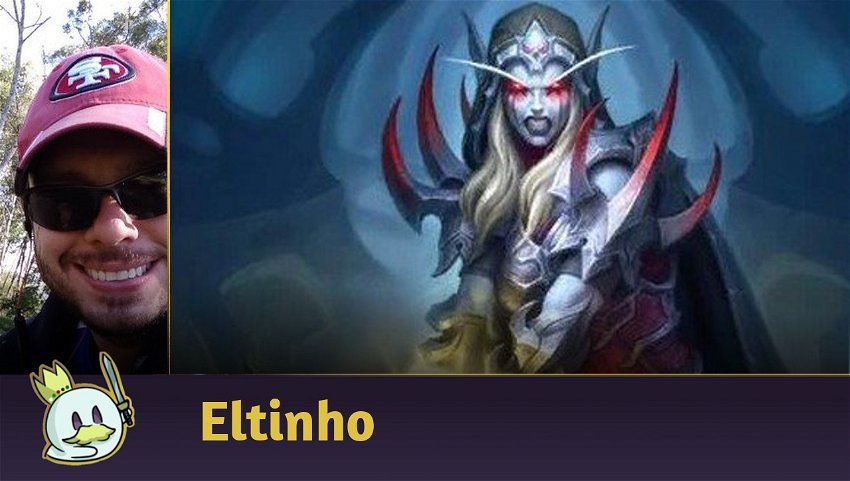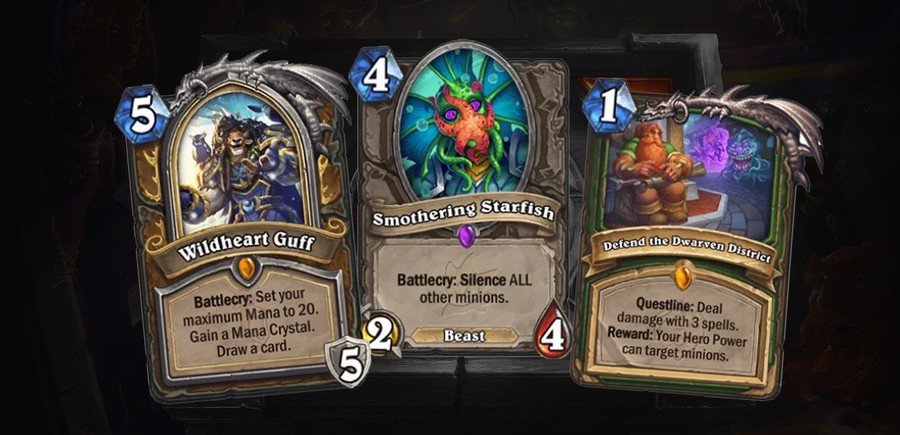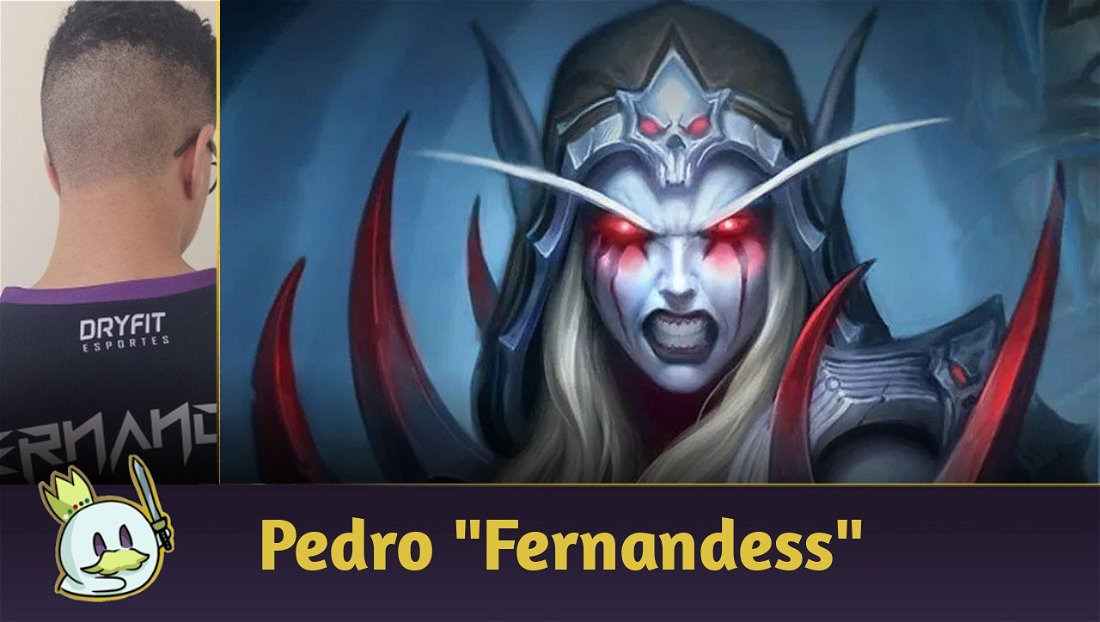Silence! All rise to the Honorable Judge Jailer! Sylvanas Windrunner's trial has begun!
The Maw and Disorder miniset was released on September 27, and with it, 35 new cards were added to the set Murder at Castle Nathria, with the potential to change the power balance between classes.
Let's take a look at what this expansion offers us for the Standard format:
Demon Hunter
Prosecutor Mel'tranix
Ad

The newest addition to a crop of disruptive cards for the Year of the Hydra — Blademaster Okani and Theotar, the Mad Duke are the standouts of this bunch — this card harks back to an old acquaintance, Loatheb, capable of messing up your opponent's entire turn.
More reactive decks are restricted to the card drawn this turn and the leftmost deck, usually a slower card that ended up not being used. While not strong against (or in) Aggro decks, its impact against Control and Midrange makes this one of the best cards in the set.
Score: ★★★★☆
Sightless Magistrate

If the above card impacts slower decks, this is the curve-topper for super-aggressive decks, allowing them to recharge for yet another wave of aggression, adding redundancy to Magnifying Glaive.
If (or when) Aggro Demon Hunter goes up, this card will be involved.
Score: ★★★★☆
All Fel Break Loose

A custom-made card for Big Demons DH. Unfortunately, that deck doesn't exist.
Score: ★☆☆☆☆
Druid
Incarceration

In general, this class doesn't have access to non-conditional minion removal, Naturalize or Mulch, for example, or has to resort to direct damage or neutral cards.
This card here won't make Malfurion leave the second option.
Score: ★☆☆☆☆
Dew Process

A permanent effect like this is new to Hearthstone. This is a pretty dangerous card to make against aggressive decks, as they have the advantage of drawing the card first, but can make more reactive decks drown in cards.
Can spawn two archetypes: Mill Druid and Prestor Druid.
Score: ★★☆☆☆
Attorney-at-Maw

Since the Ironbeak Owl nerf, we haven't had access to a 2 mana silence minion.
With the nerf on Smothering Starfish, this fellow has room to appear and even has a way to not get dead in games where silencing is not so necessary. A nice addition to the class's arsenal.
Score: ★★★☆☆
Hunter
Defense Attorney Nathanos

Nathanos is a value generating machine and can fit in well with the Big Beast Hunter, where he is particularly strong with Sunken Saber.
However, the need to have Deathrattle activated beforehand can create situations where it is not active, which can lead to changes to the deck structure to add more minions with this ability.
Score: ★★★☆☆
Shadehound

Without being Infused, this is a pretty average card within the current Hunter lists, and it doesn't have very efficient synergy with Pet Collector. However, it can be included in slightly more tailored lists, with things like Snake Trap and the newbie Afterlife Attendant (more on that later).
Score: ★★☆☆☆
Motion Denied

This updated version of Rat Trap swaps the 6/6 body for damage directly on the opponent. While some lists might make better use of damage, in the current format, Rat would be better.
Ad
Note that this secret is also added to the Beaststalker Tavish's option pool.
Score: ★★☆☆☆
Mage
Objection!

A Counterspell for minions, on the one hand it's not possible to activate it with Coin, on the other hand, minions are generally more expendable, which in general makes this card worse than its counterpart.
It's an attempt by Blizzard to try to put Secret Mage on the radar again, but it still lacks something for the archetype to establish itself as competitive.
Score: ★★☆☆☆
Life Sentence

An improved Polymorph is still an inefficient removal.
Score: ★★☆☆☆
Contract Conjurer

The second piece in the attempt to bring back the Secret Mage, it's not difficult this minion offers a good amount of stats for just 3 mana and, with a little work and luck, for 0. Anonymous Informant and Sketchy Stranger (providing cheaper Secrets) can help with this proposal.
It's a card in the right direction of making the deck viable, but it's still not Aluneth or Sayge, Seer of Darkmoon that were the key to the archetype's success in the past.
Score: ★★★☆☆
Paladin
Class Action Lawyer

Like the Secret Mage mentioned in the previous class, Blizzard has been forcing the existence of Pure Paladin, a deck that gains advantages when giving up neutral cards.
And with that, we've been graced with one of the strongest cards for this archetype, a minion just the right size to break through your opponent's biggest threat without affecting your development. Great card within this proposal.
Score: ★★★★☆
Order in the Court

Lorekeeper Polkelt was a minion with such a strong effect that it was nerfed from 4 to 5 mana. And now this effect only costs 2 mana for Uther's friends! This card pretty much guarantees that any Paladin deck will play Lightforged Cariel on the curve. Coincidentally, Cariel is Paladin's most powerful card. If before the miniset, the class was on life support, Order in the Court could be the differentiator to bring it back into combat.
Score: ★★★★★
Jury Duty

Another archetype that has received buffs and some support, but is still a few steps away from being viable is the Dude Paladin.
Jury Duty is yet another piece in that puzzle and will certainly be a vital part of the deck if it ever shows up. Maybe with the next expansion; keep an eye on it!
Score: ★★★☆☆
Priest
Theft Accusation

This Accusation is the first card in a cycle of removals conditioned to other effects, this one seems to be the ideal card for the Thief Priest.
Only The Light! It Burns! is already a more efficient removal for the same cost and without having to go back to activate the effect. Interestingly, it's a Shadow spell, which might be relevant to Lightmaw Netherdrake.
Score: ★★☆☆☆
Clear Conscience

Ad
Buff Priest, the more all-in version of Naga Priest, seems to be home to this new spell. Putting this on a Radiant Elemental should ensure it survives for high explosive turns.
It shouldn't see much play outside the archetype, though, except perhaps as a spell learned by a Nagaling from School Teacher.
Score: ★★★☆☆
Incriminating Psychic

A generic card for Thief Priest that is probably not good enough to see play there.
Score: ★★☆☆☆
Rogue
Scribbling Stenographer

Edwin Rogue suffered from the reversal of its main card's buff, but it's still a very competitive deck. This stenographer might not be as efficient as Wildpaw Gnoll, but it still offers many stats quickly for little or no mana.
Score: ★★★☆☆
Murder Accusation

The second of the Accusations, it is difficult to activate in a class that already has a lot of much more efficient removals.
Score: ★☆☆☆☆
Perjury

Speaking of archetypes that failed to take off, Blizzard has been doing its best to make Secret Rogue more than just a meme. Watch it fail miserably.
Score: ★★☆☆☆
Shaman
Framester

A good card to counter Highlander decks that don't exist in the current format. And, contrary to what it implies, it is not a Mana Burn: when drawn, it overloads the crystals for the next turn.
Score: ★★☆☆☆
Torghast Custodian

A real opponent grinding machine. In the Arena. On Standard, there is no place for this beast.
Score: ★☆☆☆☆
Totemic Evidence

Although it is a card for (another) forced archetype that has yet to take off, Totem Shaman, the true potential of this card lies in its use with Bioluminescence, where for 1 mana you can generate 4 bodies to receive +1 magic damage. It might yield something interesting.
Score: ★★☆☆☆
Warlock
Habeas Corpses

It's an engine waiting for the right shell. There's currently no broken interaction to abuse this card, but it's the kind of spell that goes dormant for a while until the second half of the combo kicks in.
Score: ★★☆☆☆
Arson Accusation

The third Accusation is ultimately the one with the most playability, as at worst, your hero power triggers the effect. It can also be triggered by the numerous self-damage effects the Gul'dan has at its disposal or even by the minion's attack, like Reckoning.
Score: ★★★☆☆
Imp-oster

In an ideal world, this imp copies another buff by Vile Library. But often it ends up being a 1 mana for 2 mana minion.
Score: ★★☆☆☆
Warrior
Weapon Expert

What a wonderful card! Fits into any of the Warrior archetypes and is not dead even if you've drawn all weapons. Both Enrage Warrior and Control versions want to see their weapons early, and here you ensure that this happens more often, in addition to leaving a body on the board.
Ad
Score: ★★★★★
Call to the Stand

Dirty Rat without the mouse. In general, Control Warrior has no problem holding Aggro decks, it's the late game opponents that difficult it.
At this point, the deck has at its disposal a huge arsenal of tools to disrupt the opponent's plans between this spell, Theotar, the Mad Duke and Mutanus the Devourer, which can be the differential to make the deck compete with the slower decks.
Score: ★★★★☆
Mawsworn Bailiff

Cards better than this failed to see play, nothing to see here.
Score: ★☆☆☆☆
Neutral
Tight-Lipped Witness

A tech card to counter decks that don't see play at the format. Guilty!
Score: ★☆☆☆☆
Afterlife Attendant

This card, while it has potential, can easily be overrated. Most of the synergies with Infuse manage to activate normally throughout the game, although topdecking cards later can greatly reduce their value, which in theory Attendant would avoid, by already Imbuing the cards beforehand.
The problem is doing so, as you depend on a 3/4 with no abilities, and it doesn't do anything extra if it dies at the same time as other minions. In a deck built for this purpose and with previous triggers (Snake Trap, Batty Guest), it can demonstrate greater potential.
Score: ★★★☆☆
Soul Seeker

Another disruptive card! But this one is pretty fickle and will hardly hit exactly what you need. Maybe if the Metagame slows down enough to become a battle of giants, Soul Seeker might become a more realistic option.
Score: ★★☆☆☆
Sylvanas, the Accused

The new version of one of Warcraft's most iconic characters is a pretty cool card. Imbuir's cost is high, but even at its base level, Sylvanas is efficient — remember old The Black Knight? And when activated, it can reverse the entire flow of the game, not even activating the poor target's Deathrattle.
Score: ★★★★☆
The Jailer

And finally, we come to the weirdest card in the mini-set. Summoning The Jailer is like going all-in and playing every card on the board in Poker: you give up everything else (including the Taunt ability — immune minions cannot have Taunt) to have semi-immortal minions, with the which you intend to end the game before Fatigue accumulates.
On Immune, you should treat minions as if they have Divine Shield and Stealth permanently: they don't take damage, can't be targeted, but can still die to general destruction spells. As this is a one-time effect with nothing like it, it's hard to assess. Personally, I don't think it's worth the sacrifice, but that doesn't stop players from trying to break the card.
Score: ★★★☆☆
Conclusion
Maw and Disorder wasn't the most powerful or most memorable mini-set (Hello Darkmoon Race!), but it did add things for us to work on and develop some classes that were far below others, like Paladin.
Ad
Currently, the Big Beast Hunter seems to be a notch above the others in the format and is quite capable of adjustments to come in the future, but other than that, the other classes seem to be pretty balanced in the first analyzes.
I hope you liked this review, until next time!









— Comentários0
Seja o primeiro a comentar